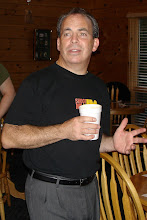 When it comes to politics and elections in the year 2010, it is clear the new marketing credo is to muddy the waters until nothing is clear... or preferably even visible. Of course dirty politics is not a new concept. Hell, even filthy politics has been around for centuries.
When it comes to politics and elections in the year 2010, it is clear the new marketing credo is to muddy the waters until nothing is clear... or preferably even visible. Of course dirty politics is not a new concept. Hell, even filthy politics has been around for centuries.But the newest phase of political campaigning – flood the airwaves and Internet with a tsunami wave of lies and innuendos until virtually everyone is gasping for air – well, that's new. Choking the life out of people until they are powerless to understand, let alone care enough to vote, that is a new low for the electoral process.
On the other hand, particularly during the economic recession, congratulations to all the media outlets – traditional and online – who have reaped the benefits of the deluge of ad dollars being pumped into their revenue streams for the express purpose of drowning out the truth.
Back in the '60s, Timothy Leary encouraged us to "turn on, tune in and drop out." He wasn't just talking about getting high, he was encouraging the masses to detach themselves from the existing conventions and hierarchies in society. Given the current state of political campaigning, a flashback may be in order.



